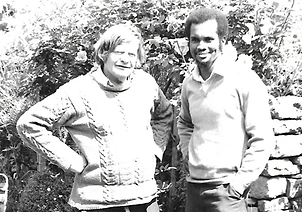
Immersive and Collaborative Learning
A roundtable discussion at the African Studies Association annual meeting - “Ruptures: African Studies and the Racial Politics of Knowledge Production” - continued reflections on Professor Jean Allman’s plenary lecture as outgoing ASA president. I intervened to state that some Black scholars had different experiences with their mentors and other senior scholars from the ones criticized. Subsequently, I began a re-examination of the life and work of the distinguished British scholar, Thomas Lionel Hodgkin (1910-1982). Hodgkin had introduced me to the study of African politics at Oxford University in 1968 and supervised my doctoral research on the late-colonial experiences of Cameroon. He was an exemplar of engaged scholarship and immersive and collaborative learning.
The first outcome of this exercise will be a paper, “Agency, Access, and Action: The Enduring Legacy of Thomas L. Hodgkin”, to be presented at a graduate students conference, “Decolonizing African Studies”, at Northwestern University April 4-5, 2019. Other research and writing projects regarding Hodgkin’s pioneering work on African history and politics will follow.

With Thomas Hodgkin, Ilmington, England
A Fund for Collaborative Learning will be created to provide financial support for activities identified in this document. This work effectively began a few years ago with the pruning and organizing of my personal archives by undergraduate assistants. Simultaneously, they conducted research projects on peace and democracy initiatives of The Carter Center, Atlanta.

Observing ballot count, Carter Center and National Democratic Institute, Zambia, 1991
A Network on Collaborative Learning will be activated and expanded. It exists implicitly as a collegial network of scholars of Africa and of state, governance, and democratic development. Our interactions have taken place over many years of engagement with the continent and on these topics. The asymmetries in institutional capacities between the Global North and South, and in the possession of African artworks, are now widely acknowledged. Complementing my work as a researcher, university lecturer, and policy advocate, I hope to share my personal library and abundant teaching materials with African institutions. The selective digitization and open access to personal archives will also be increased. These activities will be guided by the priorities identified during the ASA brainstorming session:
-
Engaged Scholarship and Immersive Learning
-
Improving African access to, and co-production, of knowledge
-
Closing the Governance Gap
-
Building Democracy
-
Reclaiming Security
